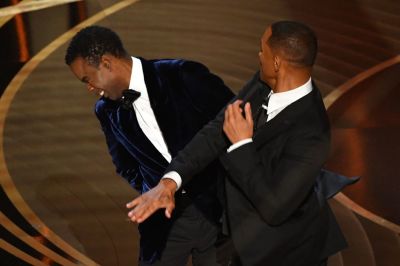The Will Smith event: Why it matters

Approximately a billion people around the globe witnessed Will Smith’s physical assault on comedian Chris Rock at the 2022 Oscars. The “event” has generated a media frenzy with people’s opinions oscillating all over the emotional map.
Will Smith himself, upon reflection, has resigned from the Academy of Motion Picture Arts and Sciences and stated that his behavior was “shocking, painful, and inexcusable.”
While I wholeheartedly agree that his behavior was inexcusable, I strongly believe it was understandable.
It was inexcusable because, in a society based on the rule of law, private citizens resorting to violence against their fellow citizens cannot be condoned or approved without undermining the rule of law itself, a very precious and valuable thing.
At this point, in the interest of full disclosure, I need to acknowledge I have been married for 51 years to a Ph.D. psychotherapist and marriage and family counselor. Consequently, in the course of that marriage and the two “becoming one flesh,” I have been exposed to, and read, more research on psychology and marriage and family issues than the vast majority of non-psychologists. Conversely, my wife, whom I met in seminary, has been exposed to more theological and ethics research than most psychotherapists.
Why then is Will Smith’s behavior understandable? A powerful and tragic insight is provided by a searing passage in his memoir, Will, published last year. In talking about his complicated relationship with his father, an Air Force veteran and alcoholic who died in 2016, Will revealed an obviously traumatizing episode of his childhood. He described how, as a 9-year-old child, he witnessed a terrible episode of domestic violence:
“I watched my father punch my mother in the side of the head so hard that she collapsed…I saw her spit blood. That moment in the bedroom, probably more than any other moment in my life, has defined who I am.”
Will Smith went on to explain:
“Within everything that I have done since then — the awards and the accolades, the spotlights and attention, the characters and the laughs — there has been a subtle string of apologies to my mother for my inaction that day. For failing her in that moment. For failing to stand up to my father. For being a coward.”
It has been said, “No one ever completely escapes the zip code in which they were born,” which is a catchy way of explaining that we are impacted greatly by the socio-economic background and family culture of our families of origin. I cannot even begin to imagine the emotional trauma of being a 9-year-old boy and experiencing what Will did.
It is certainly not hard to understand that when Chris Rock made the tasteless and hurtful joke about Will’s wife Jada’s appearance (hair loss as a consequence of alopecia), it triggered all those emotions of rage, shame, and misplaced guilt. All of a sudden, when his wife expressed her pain, he was that 9-year-old boy again, and “By God, I’m not going to fail my loved one again,” and he jumped up and acted.
I have certainly witnessed such triggering episodes in my ministry and in my pastorates. My wife assures me she has seen it as well in her counseling ministry over a half-century of practice.
One very memorable episode in my ministry springs to mind. When I was a professor, I had a very bright ministry student who had obvious gifts and a promising future. Then it came to light that he had committed several sexual assaults on older women (he was in his early 20s).
When he was arrested, I must confess I have never been more shocked than I was at that moment. I went to see him in jail and over the course of ministering to him while he was tried and found guilty (he confessed to the crimes), he shared with me that when he was a small boy (beginning when he was barely 3), his mother had regularly tied him down and tortured him (and I don’t know any other word that adequately describes the nature of the abuse he endured). That deep emotional trauma erupted in acts of sexual violence against women approximately his mother’s age.
Was this young man guilty? Yes. Did he deserve to go to prison? Yes. Was his behavior at least partially explained by the horrible trauma he experienced at the hands of his own mother? Yes. Inexcusable? Yes! Understandable? Indeed!
What lessons should we draw from the Will Smith “event”? First, we need to reaffirm that mitigating circumstances and childhood trauma do not excuse such violent behavior. However, many people are secretly carrying some heavy and debilitating emotional trauma around with them.
Second, understanding this, we need to encourage people to seek counseling to deal with these painful and debilitating experiences from the past. Friends of Will Smith, reading his memoir, should have approached him and urged him to get the psychological counseling he so obviously needed, separate and apart from any counseling he may have received during the process of reconciling with Jada.
Third, we need to renew and redouble our efforts to minimize domestic abuse with its ever-widening circles of emotional and physical damage.
And while destructive behavior must be punished, as Christians we should always be sharing the “Good News” of the Gospel, that there is a new beginning in Jesus. As an old poem puts it, “Oh, I wish there was someplace called the land of beginning again, where I could take all my heartaches and broken dreams, and drop them at the door like a shabby old coat and never put them on again.”
The Gospel’s “Good News” is that there is a land of “beginning again,” wherein Christ we are liberated from our past. Christianity proclaims to us that we are not the prisoners of our past.
As the Apostle John promised us:
“For whatever is born of God overcomes the world. And this is the victory that has overcome the world—our faith.
“Who is he who overcomes the world, but he who believes that Jesus is the Son of God?” (I Jn. 5:4-5)
P.S. What should Will Smith have done when Chris Rock made his hurtful comments about his wife’s appearance? I believe he should have said to his wife, “Sweetheart, we are leaving.” Then he should have taken his wife by the arm, and as an Oscar nominee, calmly walked out of the theater with his entourage behind him.
Dr. Richard Land, BA (Princeton, magna cum laude); D.Phil. (Oxford); Th.M (New Orleans Seminary). Dr. Land served as President of Southern Evangelical Seminary from July 2013 until July 2021. Upon his retirement, he was honored as President Emeritus and he continues to serve as an Adjunct Professor of Theology & Ethics. Dr. Land previously served as President of the Southern Baptist Convention's Ethics & Religious Liberty Commission (1988-2013) where he was also honored as President Emeritus upon his retirement. Dr. Land has also served as an Executive Editor and columnist for The Christian Post since 2011.
Dr. Land explores many timely and critical topics in his daily radio feature, “Bringing Every Thought Captive,” and in his weekly column for CP.



























